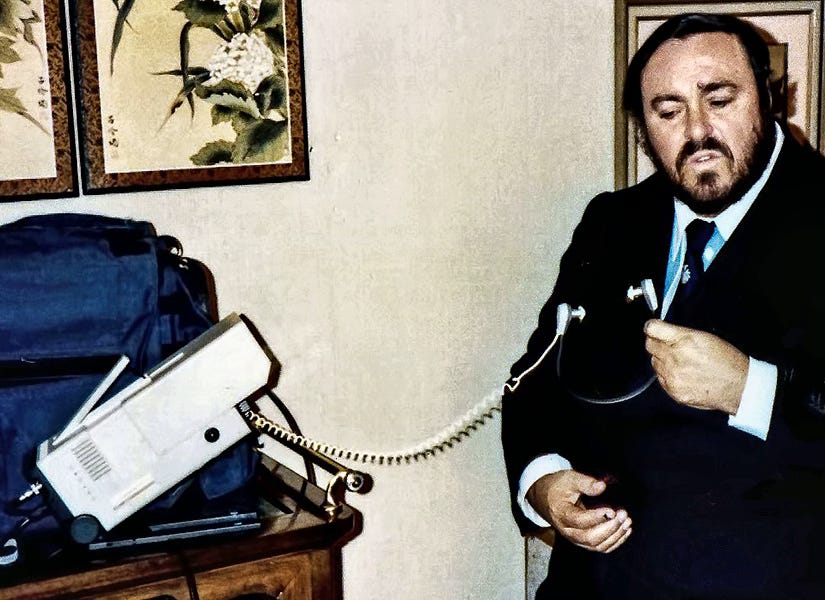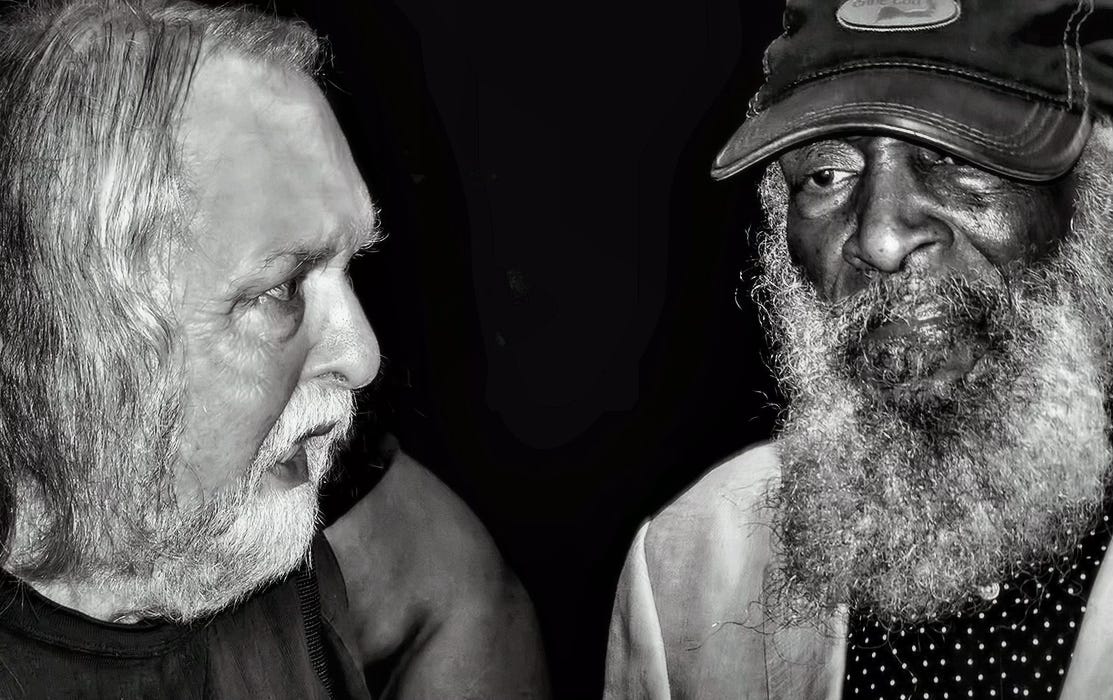Southern soul and R&B singer Sam Moore is 88 years old today
Sam Moore, New York City, 2006
Photo by Frank Beacham
Sam Moore is 88 years old today.
A Southern soul and R&B singer, Moore was the tenor vocalist for the soul vocal duo, Sam & Dave, from 1961 to 1981.
Sam & Dave were the most successful and critically acclaimed duo in soul music history. Since then, Moore has achieved a distinguished 25-plus year career as a solo performing and recording artist.
In 2008, based on a poll of other musicians, Moore was named one of the 100 greatest singers of the rock era (1950s-2008).
Moore has performed in concerts, ranging from the Atlantic Records 40th anniversary party in 1988, to the New Orleans Jazz Festival and the SXSW Music Industry conference in 2006. He has also performed in various venues ranging from the tribute for Elvis Presley in 1994 to the Kennedy Center Honors in 2006 for Smokey Robinson.
Moore has also partnered with other famous recording artists, including Conway Twitty, Bruce Springsteen, Don Henley, Elton John, Phil Collins, Lou Reed and others on various live and recorded performances.
Sam Moore and Dave Prater were both experienced gospel music singers, having performed individually with groups the Sensational Hummingbirds and The Melionaires. They met in The King of Hearts Club in Miami in 1961, where they were discovered by regional producer, Henry Stone, who signed them to Roulette Records.
After modest success at Roulette, they were signed by Jerry Wexler to Atlantic Records in 1964, then being “loaned” out to Stax Records to produce, record and release their records.
The duo's November, 1965 single, "You Don't Know Like I Know," started a series of ten straight Top 20 Billboard R&B hits that included "Hold On! I'm Comin'" (1966), "You Got Me Hummin' (1966), "When Something Is Wrong with My Baby" (1967), "Soul Man" (1967) and "I Thank You" (1968).
Most of their hits were penned by Isaac Hayes and David Porter. In most recordings, they were also backed by Hayes on piano with Booker T and the MGs and The Memphis Horns.
The ending of their association with the Stax record label and their frequently volatile relationship contributed to their first break-up in 1970.
Sam & Dave performed throughout most of the 1970s through 1981, and enjoyed a brief resurgence in popularity due to The Blues Brothers's 1979 recording of "Soul Man.” Their last performance together was on December 31, 1981, at the Old Waldorf in San Francisco.
On April 9 1988, Prater died in a car crash in Sycamore, Georgia.
Here, Moore performs “I’ve Been Loving You” with the Blues Brothers Band at the Atlantic Records 40th Anniversary concert in 1988.
Sam and Dave perform "Hold On, I’m Coming," 1966.
Luciano Pavarotti was born 88 years ago today.
An Italian operatic tenor, who also crossed over into popular music, Pavarotti eventually became one of the most commercially successful tenors of all time. He made numerous recordings of complete operas and individual arias, and established himself as one of the finest tenors of the 20th century.
He was one of The Three Tenors (with Plácido Domingo and José Carreras) and became well known for his televised concerts and media appearances. Pavarotti was also noted for his charity work on behalf of refugees and the Red Cross.
Pavarotti began his professional career as a tenor in 1961 in Italy. That same year, he made his first international appearance in La traviata in Belgrade, Yugoslavia. He sang in opera houses in addition to Italy, in the Netherlands, Vienna, London, Ankara, Budapest and Barcelona.
The young tenor earned valuable experience and recognition while touring Australia at the invitation of soprano Joan Sutherland in 1965. He made his United States debut in Miami soon afterwards, also on Sutherland's recommendation.
His position as a leading lyric tenor was consolidated in the years between 1966 and 1972, during which time he first appeared at Milan's La Scala and other major European houses. In 1968, he debuted at New York City's Metropolitan Opera as Rodolfo in Puccini's La bohème.
At the Met in 1972, in the role of Tonio in Donizetti's La fille du régiment, he earned the title "King of the high Cs" when he sang the aria "Ah mes amis ... pour mon âme.” He gained worldwide fame for the brilliance and beauty of his tone, especially into the upper register. He was at his best in bel canto operas, pre-Aida Verdi roles and Puccini works such as La bohème, Tosca and Madama Butterfly.
The late 1970s and 1980s saw Pavarotti continue to make significant appearances in the world's foremost opera houses.
Pavarotti died from pancreatic cancer on September 6, 2007 at age 71.
Here, Pavarotti performs “It’s a Man’s World” with James Brown.
Luciano Pavarotti with Frank Beacham and camera operator, Warren Jones, in Miami, 1982
Luciano Pavarotti was an absolute perfectionist about the recording of his own voice.
After a bad experience with sound at a public performance early in his career in Miami, the great tenor took matters into his own hands and hired two personal sound operators. He took them everywhere he performed.
He also became the largest single owner of German-made Schoeps microphones in the world. These were the only microphones he would use to amplify or record his voice in concert situations.
In Miami in the 1970s and early 80s, my company, Television Matrix, did several video shoots with Pavarotti. He was a very funny man, but also a demanding, hands-on talent. We always used Schoeps microphones when working with him.
Pavarotti trusted only himself to check to see that his voice was recorded up to his standards. This photo was made after a particularly difficult shoot in Miami. Pavarotti listened carefully, as I agonized nearby. Fortunately, he gave his approval.
This photo was made in 1982 in Miami by Frank Beacham, as he awaited Pavarotti’s verdict on the recording.
Dick Gregory speaks at the 2011 funeral for singer James Brown
Photo by Lucas Jackson
Dick Gregory, comedian, social activist, social critic, writer, conspiracy theorist and entrepreneur, was born 91 years ago today.
Gregory was an influential American comedian who used his performance skills to convey to both white and black audiences his political message on civil rights. His social satire helped change the way white Americans perceived black American comedians since he first performed in public.
As a poor student in St. Louis who excelled at running, Gregory was aided by teachers at Sumner High School, among them Warren St. James. Gregory earned a track scholarship to Southern Illinois University Carbondale. There he set school records as a half-miler and miler.
His college career was interrupted for two years in 1954 when he was drafted into the U.S. Army. The army was where he got his start in comedy, entering and winning several Army talent shows at the urging of his commanding officer, who had taken notice of Gregory's penchant for joking.
In 1956, Gregory briefly returned to SIU after his discharge, but dropped out because he felt that the university "didn't want me to study, they wanted me to run."
In the hopes of performing comedy professionally, Gregory moved to Chicago, where he became part of a new generation of black comedians that included Nipsey Russell, Bill Cosby and Godfrey Cambridge, all of whom broke with the minstrel tradition, which presented stereotypical black characters.
Gregory drew on current events, especially racial issues, for much of his material. "Segregation is not all bad. Have you ever heard of a collision where the people in the back of the bus got hurt?”
In 1961, while working at the black-owned Roberts Show Bar in Chicago, he was spotted by Hugh Hefner performing the following material before a largely white audience: “Good evening, ladies and gentlemen. I understand there are a good many Southerners in the room tonight. I know the South very well. I spent twenty years there one night.
“Last time I was down South I walked into this restaurant and this white waitress came up to me and said, ‘We don't serve colored people here.’ I responded: ‘That's all right. I don't eat colored people. Bring me a whole fried chicken.’
“Then these three white boys came up to me and said, ‘Boy, we're giving you fair warning. Anything you do to that chicken, we're gonna do to you.’ So I put down my knife and fork, I picked up that chicken and I kissed it. Then I said, ‘Line up, boys!’”
Hefner hired Gregory to work at the Chicago Playboy Club as a replacement for comedian Professor Irwin Corey. Until the end of his life, Gregory continued to perform and be a powerful voice.
He was featured in Listen, Whitey: The Sights and Sounds of Black Power 1965–1975, a book by Pat Thomas which uses the political recordings of the Civil Rights era to highlight sociopolitical meanings throughout the movement.
Two years ago, actor Joe Morton played Dick Gregory in the play, Turn Me Loose, at the Westside Theatre in Manhattan.
A week prior to his death, Gregory was hospitalized in Washington, D.C., with a bacterial infection. He died at the hospital in Washington, D.C., on August 19, 2017, at the age of 84. The cause was heart failure.
Here, Gregory makes a standup appearance on Merv Griffin in 1965.
Dick Gregory and Frank Beacham, New York City, 2016
(We are talking about the killing of Medgar Evers, Gregory's close friend, in Mississippi)
Melvin Franklin, bass singer for The Temptations, was born 81 years ago today.
Franklin was born as David English in Montgomery, Alabama to Rose English, a teenage mother from Mobile. His biological father was the preacher of the English family's church in Mobile. According to an account by Franklin’s mother, she was impregnated unwillingly by the preacher.
Following David's birth, Rose English married Willard Franklin and moved to Detroit, her grandmother insisting young David be left behind in her care. David English finally moved to Detroit with his mother and stepfather in 1952 at age ten.
Taking on his stepfather's surname for his stage name as a teenager, David English —now Melvin Franklin — was a member of a number of local singing groups in Detroit, including The Voice Masters with Lamont Dozier and David Ruffin.
In 1958, a classmate of Franklin's at Northwestern High School, Otis Williams, invited Franklin to join his singing group, Otis Williams and the Siberians. Franklin joined the group as its bass singer, and remained with Williams and Elbridge Bryant when they, Paul Williams and Eddie Kendricks formed The Elgins in late 1960.
In March, 1961, the Elgins signed with Motown Records under a new name: The Temptations. Since Franklin had a fondness for the color blue, he was nicknamed "Blue" by fellow singers.
Otis and Melvin were the only Temptations who never quit the group. One of the most famous bass singers in black music over his long career, Franklin's deep vocals became a signature trademark of the group.
In the late 1960s, Franklin was diagnosed with arthritis, the symptoms of which he combated with cortisone so that he could continue performing. The constant use of cortisone left his immune system open to other infections and health problems. As a result Franklin developed diabetes in the early 1980s and later contracted necrotizing fasciitis.
On February 17, 1995, after a series of seizures, Melvin collapsed into a coma and remained unconscious until his death on February 23, 1995. He died in his wife Kimberly's arms.
Here, the Temptations perform “Ol’ Man River,” featuring Melvin Franklin.
John Denver died in an aircraft accident 26 years ago today.
To those who bought records like “Rocky Mountain High” and “Take Me Home, Country Roads” by the millions in the 1970s, Denver was much more than just a great songwriter and performer.
With his oversized glasses, bowl haircut and down vest, he was an unlikely fashion icon, and with his vocal environmentalism, he was the living embodiment of an outdoorsy lifestyle that many 20-something baby boomers would adopt as their own.
Denver died on this day in 1997 when his experimental amateur aircraft crashed into Monterey Bay on the California coast.
Born Henry John Deutschendorf, Jr., in 1943 — not in the mountains of Colorado but in Roswell, New Mexico — Denver rose to fame as a recording artist in 1971, when "Take Me Home, Country Roads" rose all the way to #2 on the Billboard pop chart.
In fact, Denver already had a share in a #1 hit as the writer of "Leaving On A Jet Plane," a chart-topper for Peter, Paul and Mary in 1969.
But it was his 1971 breakout as a performer of his own material that made him a household name. Over the course of the 1970s, Denver earned five more Top 10 singles, including the #1 hits "Sunshine On My Shoulders" (1974), "Annie's Song" (1974), "Thank God I'm A Country Boy" (1975) and "I'm Sorry" (1975).
He released 11 albums that were certified Platinum, making him one of the most successful recording artists of the 70s. By the 1990s, Denver was still a popular touring musician, though he was no longer recording new material with significant commercial success.
Over the course of his career, he had become an accomplished private pilot with more than 2,700 hours on various single-and multi-engine aircraft, with both an instrument and a Lear Jet rating.
On October 12, 1997, however, he was flying an unfamiliar aircraft with which he had previously experienced control problems, according to a later investigation by the National Transportation Safety Board.
At approximately 5:30 pm local time, after a smooth takeoff from a Pacific Grove airfield and under ideal flying conditions, Denver apparently lost control of his Long-EZ aircraft several hundred feet over Monterey Bay, leading to the fatal crash.
Thanks History.com
Here, Denver sings “Rocky Mountain High.”
In 1955 — 68 years ago — The Chrysler Corporation launched high fidelity record players for their 1956 line-up of cars.
The unit measured about four inches high and less than a foot wide and mounted under the instrument panel.
The seven inch discs spun at 16 2/3 rpm and required almost three times the number of grooves per inch as an LP.
The players were not a success and were discontinued in 1961.












